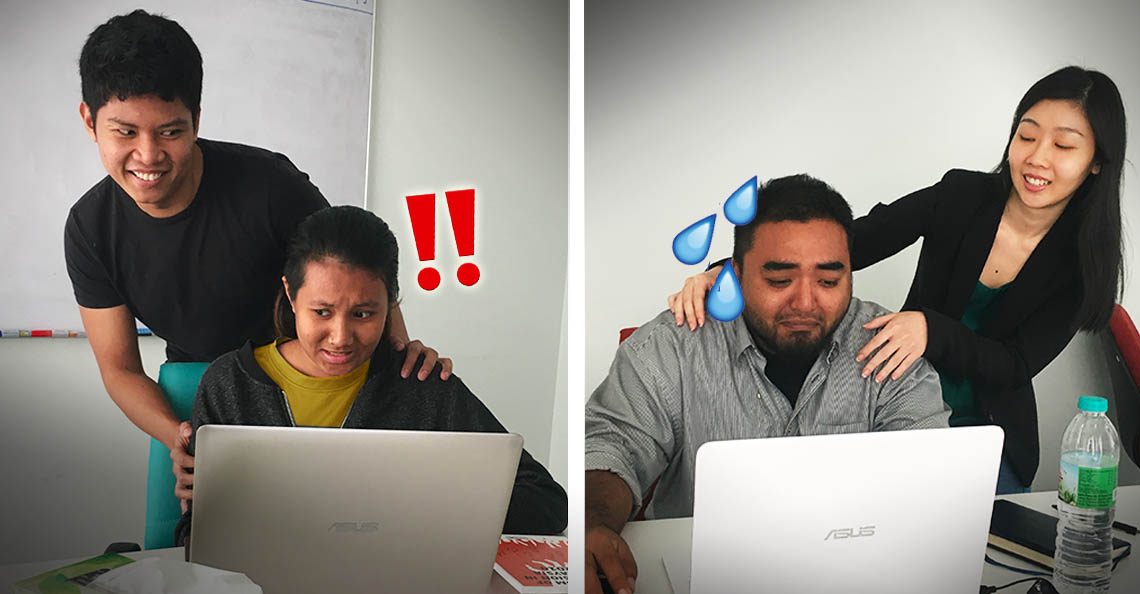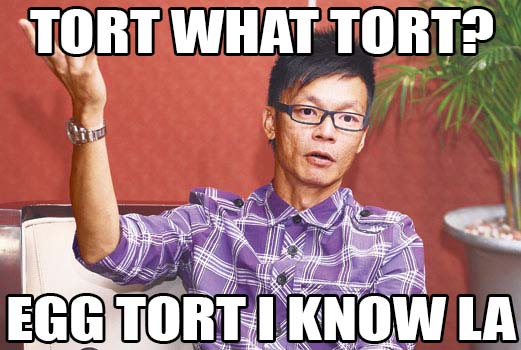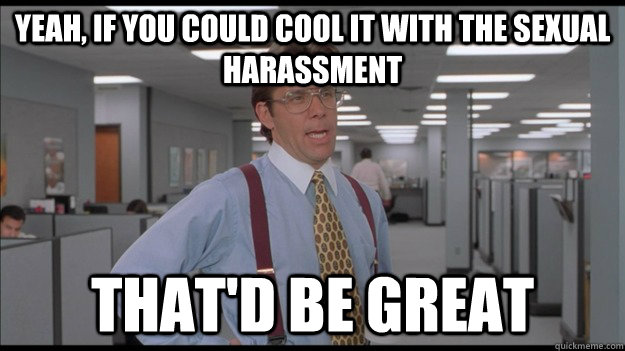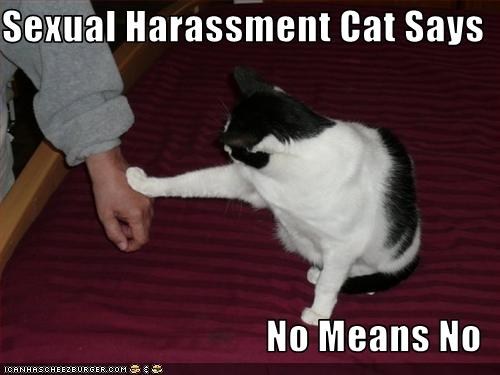Boss GATAL with you? Malaysians didn’t have a law for it till NOW.

- 2.8KShares
- Facebook2.5K
- Twitter31
- LinkedIn46
- Email42
- WhatsApp115
(Trigger warning: This article may be sensitive to some readers who have experienced crimes of a sexual nature)
Early October this year, the New York Times published a shocking expose on disgraced Harvey Weinstein, a Hollywood big-timer with a massive influence. It alleged that he had sexually harassed and abused women for more than 30 years, with records of victims such as Angeline Jolie and Gwyneth Paltrow. The news has since gone global, with other victims of sexual harassment and abuse speaking up about their experiences as part of the #metoo campaign.
There’s no surprise that sexual harassment happens anywhere, and to anyone regardless of their gender. So how do Malaysians get justice when it happens to them, especially when it comes to the workplace?
If you work in an office, chances are pretty high that you’d want your work environment to be as comfortable as possible – clean toilets, a nice desk, friendly colleagues, a boss who always tells you how pretty you look and that you should be his second wife…
Wait, maybe not the last one.
The last one was something that Tabung Haji employee Asmah Mohd Nor’s manager said to her, along with vulgar jokes and advice to pray for sexy dreams and how to measure a man’s sexual prowess using a coconut (???).

And Asmah isn’t alone, because according to a 2003 study by the now-closed Women’s Development Collective (Thanks WAO and AWAM!), 35% of Malaysian workers surveyed (women and men) experienced some sort of sexual harassment in their workplace. And there’s very little a victim could have done about it too, because Malaysian laws don’t really cover it.
Until last week.
What happened is that Asmah made a complaint to Tabung Haji, who decided not to renew the manager’s work contract. The manager then sued Asmah for defamation, and Asmah responded by suing him back for sexual harassment. This case made its way to our highest court (Federal Court), which ultimately decided to side with Asmah and ordered the manager to pay her RM120,000 in damages.
And because of this, victims of sexual harassment can now take legal action against their harassers because – and you might be surprised to learn this – they weren’t able to before! (Even we didn’t know!) To get a better idea of the law and what sexual harassment is, we spoke to CILISOS lawyer friend Fahri Azzat (who represented the manager in court, btw) and the Women’s Aid Organization (WAO). Here’s what they told us…
Before this, you could ONLY COMPLAIN to your company and hope they do something

For as long as you’re working for someone, you’re legally protected by the Employment Act under the Ministry of Human Resources, which prevents your boss from doing bad stuff like firing you for no reason or not paying you. However, the Employment Act had nothing against your boss or colleague sexually harassing you until 2012, when it was changed to account for it.
While this was a step in the right direction, the 2012 Amendment only made it a legal requirement for the company to investigate sexual harassment claims – if they didn’t, they would be fined up to RM10,000. The punishment for the guilty offender was also kept internal. The company can either pecat, demote, or suspend the fella without pay for up to 2 weeks. (You can read the whole thing on page 87 of the Employment Act.)
Although the law allows a victim to contact the Director-General of the Ministry of Human Resources directly, the Director-General can only direct the company to conduct an investigation. Also, people who didn’t work for the company full-time weren’t covered – like if a patient were to menggatal a nurse, or a supervisor menggatalling a volunteer worker.
“All the power is in the hands of the employer. There is no way for the victim to appeal.” – WAO spokesperson, in interview with CILISOS
Which is why Asmah’s case is considered a historic one. It opens the gate for victims to take sexual harassment cases out of their companies and into the courtroom, which was something the five judges on the case felt it was time to do:
“[We decided] that it is timely to import the tort of harassment into our legal and judicial system, with sexual harassment being part of it” – Tan Sri Zulkefli Ahmad Makinudin, Chief Judge of Malaya, as quoted by The Malay Mail Online.
So it’s actually a tort and not a law. But what’s a TORT? Can eat wan ah?

According to Fahri, a tort is where something is now ‘a legal course of action’, meaning to say you can sue someone in the court if it fits the requirements of sexual harassment, which brings us to the next point…
Most people don’t know what is ‘sexual harassment’

Okay, ‘fess up. How many of you know what sexual harassment actually is? Most of us would probably imagine it to be a pervy man touching a woman, but it’s actually a little more complicated than that.
For one, sexual harassment happens to both men and women, although women are the ones who usually kena. Second, it isn’t only physical; it can be verbal and psychological as well. Here’s how it’s defined in the Employment Act:
“Sexual harassment means any unwanted conduct of a sexual nature, whether verbal, non-verbal, visual, gestural or physical, directed at a person which is offensive or humiliating or is a threat to his well-being, arising out of and in the course of his employment”
An interesting finding from the study we mentioned, men usually see dirty language and jokes as “normal guy behavior” and while women aren’t always happy with it, they usually just tahan because they’re “already immune to it”.
Also, it’s important to note that it doesn’t only happen in the workplace, but in a social setting as well (in public places). The difference though, is that in a social setting, you can always walk away.
“In an employment setting, you are earning a living there. It’s not as easy to just walk away from the incident or perpetrator.” – Fahri, in email interview with CILISOS.
But now, here comes the tricky part… how do you know if you’re being sexually harassed or not? And how do you know if you’re unintentionally harassing someone? This is where the argument becomes a little more subjective.
You can try being the judge

To give you a better idea how how tricky it might be, we gave Fahri and the WAO spokesperson five scenarios and asked them if it can be considered sexual harassment. Ideally, you should try answering it yourself before clicking on the answer la.
(And Fahri asked us to remind you again that he’s the manager’s lawyer in the Tabung Haji case #Transparency)
Scenario 1: Kumar makes a dirty joke to Ah Chong. Sally is not part of the conversation, but she can hear it. Is Sally being sexually harassed?
Click here for answer!
Scenario 2: Sarah’s boss always put his arm around her shoulder, but doesn’t do the same to anyone else. Is Sarah being sexually harassed?
Click here for answer!
Scenario 3: Ali makes sexually suggestive comments to everyone (male and female), treating it as a joke. Can Ali be accused of sexual harassment?
Click here for answer!
Scenario 4: John constantly tells Malik how large his “package” looks in a laughing manner.
Click here for answer!
Scenario 5: Christine wears a new dress to work. Matthew says if they weren’t colleagues he’d totally ask her out on a date.
Click here for answer!
How? Not easy, right? This is because what constitutes sexual harassment can sometimes be quite subjective. In fact, some of the answers given by Fahri and WAO are different because of how they’re looking at it. Fahri is seeing it from a legal standpoint – based on the tort of sexual harassment – while WAO is seeing is from the view of best practices and ethics. Each case is again different depending on the details, which we didn’t provide in the examples above.
If it’s so subjective, how do we prevent the tort (a.k.a ‘law’) from being misused?

When we first discussed this at the CILISOS office, one of the first things Lydia said was “I hate to say it, but this law will be biased against guys wan.” while Hans made Fahri proud by saying “It’s sooooo subjective. How are you going to prove it?”
This isn’t a conclusive answer but WAO says that usually in these cases, a pattern needs to be shown. The person must have either done the same thing a few times and/or to other people in order to prove a case.
“The tort of sexual harassment is where you harass someone either intensely over 1 incident or continuously, persistently and insistently over a series of incidents that causes annoyance, fear or anxiousness of a sexual nature.” – Fahri
One thing Fahri stressed was that this tort has to be fair to ALL parties involved, but especially the accused:
“The problem now is that sexual harassment has become a bit like the rape of old – easy to accuse, difficult to prove, and the accused is often harshly, unfairly, and damningly judged before the case even starts.
The process must have a very, very high standard of proof because it is so easy to accuse and the repercussions are very grave.” – Fahri
Before you accuse us and Fahri of promoting rape culture though, he has a fair point… Throughout this article, did you imagine a man harassing a woman, or a woman harassing a man? How do you distinguish between a genuine compliment and a pervy comment? Again, sexual harassment doesn’t need physical contact. How do you prove that you didn’t say those things to the victim? How can the victim prove that you did?
These are the issues that we NEED to look at in order to give both sides a fair trial.
In other words, we have a lot of work ahead of us (in a good way)

While both our interviewees agreed that there still needs to be a lot of work done to ensure that this tort (ugh, can we stop using this word?) doesn’t get misused, they also mentioned that it has now raised awareness on sexual harassment and opened up the avenue for lawmakers, companies, and the public to discuss the issue and ensure it will be fair to everyone involved.
And while sexual harassment can be subjective, it doesn’t mean that you can’t lay down certain rules to make it a little less so.
“There has to be some objective standard applied to it. Anything that distinguishes the genders or stereotypes shouldn’t have a place in the work environment.” – WAO spokesperson.
To WAO, this can start with the company culture itself. Just as how some companies don’t allow employees to date as part of their written policy, similar rules can be written down as part of company policy so that employees are clearer on what’s acceptable and what’s not. The Ministry of Human Resources actually came up with a Code of Practices that companies can use as a guideline, and you can also start by informing the person or people that what they’re doing is inappropriate.

Again, we know that there are many issues and unanswered questions about the issue of sexual harassment – after all, it’s only been a week since the tort was introduced. Given some time (and actual cases brought to court), we should be able to come up with a better idea of where the line is drawn.
But in the meantime, here’s what WAO recommends you can do if you felt you’ve been sexually harassed in the office:
- Bring it up to your HR department or the Ministry of Human Affairs if no action is taken, or if the gatal person is the owner of the company
- File a police report – this is so you have proper documentation if you decide to sue.
- Reach out to WAO at 03 7956 3488. They can advise you further.

- YOU WON’T BELIEVE WHICH MSIAN STATE HAS THE HIGHEST NO. OF RAPES
- 4 CHANGES THAT THE MALAYSIAN RAPE LAW NEEDS
- 2.8KShares
- Facebook2.5K
- Twitter31
- LinkedIn46
- Email42
- WhatsApp115



